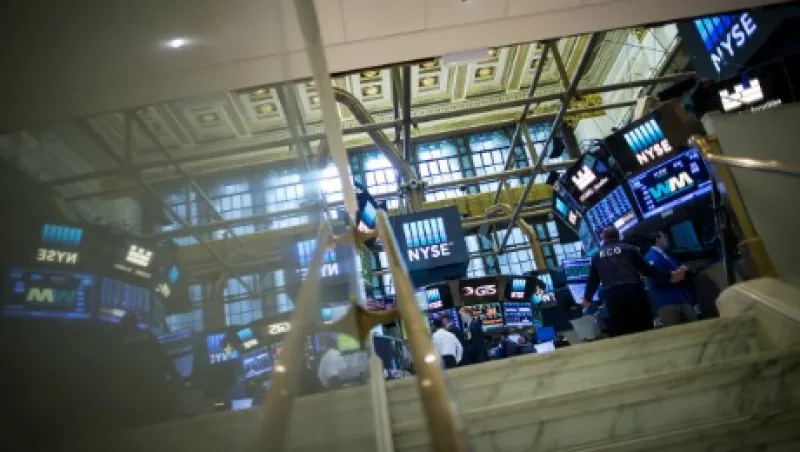With less than a week until third-quarter earnings season begins and slightly more than a month ahead of the hotly contested — and often bizarre — presidential election, U.S. financial markets appear to have taken a wait-and-see stance on a raft of issues at home and abroad, with price action largely consolidating sideways. GOP nominee Donald Trump has once again slipped behind Democrat Hillary Clinton in the polls after a disastrous week that began with a much-criticized debate performance. Derivatives markets linked to interest rates are now signaling a consensus for a Federal Reserve rate hike before year-end. The CBOE Volatility Index rose yesterday but remains well below the highs of September and June, suggesting that this uncertainty has not yet sparked a rush for the exit among allocators. Front-month Standard & Poor’s 500 futures contracts rose slightly in early trading on Tuesday but trailed a rally in Europe.
Indian central bank cuts rates. The Reserve Bank of India monetary policy announcement today included a reduction in the bank’s benchmark rate to 6.25 percent, the lowest level since 2011. The bank justified the move, under the direction of new Governor Urjit Patel, by low inflation, according to the accompanying statement, which also identified concerns over global demand and possible implications of the U.S. presidential election. Equity markets in the nation were little changed on the news, while bond yields compressed modestly. Meanwhile, the Reserve Bank of Australia held rates in check in a statement today as had been widely expected.
Sporting goods retailers to merge. In a deal announced yesterday, Springfield, Missouri-headquartered Bass Pro Shops has agreed to acquire Sidney, Nebraska-based rival Cabela’s in a cash transaction valued at roughly $4.5 billion. Both chains operate hunting- and fishing-focused megastores. The combined company will have more than 180 locations in the U.S., with Cabela’s footprint heavier in the West to Bass Pro Shops’ heavier East Coast orientation. Cabela’s has been under pressure from activist investors, including Paul Singer’s Elliott Management Corp., to cut back on costs in recent years.
U.K. stocks flirt with fresh high as pound slumps. During trading today, the FTSE-100 stock index reached above 7,000, the highest level in more than a year and close to an all-time high, as the pound fell to a three-decade low versus the U.S. dollar. Investors focused on export-centric sectors of the U.K. stock market likely to benefit from a lower pound sterling. Many analysts now predict that the Bank of England is poised take further easing action to cushion any Brexit blow to growth, a factor that could send the currency even lower against its primary trading partners.
Supreme Court to hear insider trading case. Tomorrow the U.S. Supreme Court will hear a case in which a Chicago businessman seeks to overturn a conviction for trading on nonpublic information based on the argument that the relative who provided the tip did not do so for personal gain. Regulators and defense attorneys will follow the case closely, which follows a 2014 Federal Appeals Court ruling that set a higher bar for prosecutors and vacated more than a dozen convictions in New York. The issue before the court has implications for individuals convicted in the past who are seeking new trials.
Vice presidential debate tonight. Longwood University in Virginia will host a debate this evening between Democratic vice-presidential candidate Tim Kaine and GOP rival Mike Pence. Analysts expect that both candidates will be on the offensive, attacking the track record of their opponent’s presidential candidate. For Indiana Governor Pence, the stakes are particularly high following a poor showing by his running mate Donald Trump during the first presidential debate.
Portfolio Perspective: Ready or Not Here Comes the Election — MKM Partners, Jim Strugger
Investors may be almost as tired of hearing about equity-market implications of the presidential election as about the election itself. On the bright side, in just over a month it will all be over.
On average during election years since 1984, the S&P 500 index 30-day realized volatility has peaked at 22 percent in mid-November. That compares to a reading of 12.8 percent at yesterday’s close. The seasonal pattern of volatility in election years is unmistakable, with a steady two-month rise following a mid-September trough. How much is directly related to presidential elections can be debated since the seasonal pattern of all years over the same period is fairly similar.
If the two years when the U.S. equity market was in the midst of major shocks are omitted — 2000 and 2008 — the seasonal pattern is intact but the absolute increase in volatility is more muted.
Since 1992, the most volatile SPX sectors in the six months following presidential elections — measured by the absolute average change over that period — are technology, financials and health care. They are also three of the four worst-performing sectors, with consumer staples being the other.
The largest spreads between historical volatility and RV over the last 120 days are in energy (20.5 percent 120-day vs. 9 percent historical) and materials (16.4 percent vs. 9.5 percent). Along with consumer discretionary, they are the only sectors that had just one down year. The three also had the best average performance, led by energy at 8.3 percent.
Jim Strugger is a managing director and derivatives strategist for MKM Partners in Stamford, Connecticut.






